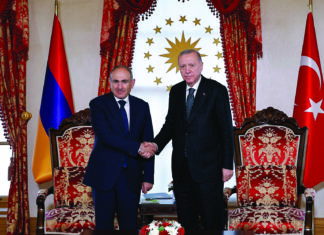By Nadeera Dickwella
Special to the Mirror-Spectator
Armenia’s intricate political journey, marked by historical struggles and the resilience of its nation, has been an ever-evolving story that has gone hand in hand with the region’s changing geopolitical dynamics. However, if history is any indication, one trend Armenia has kept a record with is reading the geopolitical context in an erroneous fashion time and again.
Let me quote three examples. The first one was so fatal that its repercussions are felt even today. The King of the Kings Tigranes the Great created an Armenian empire that had access to the Mediterranean, Black, and the Caspian seas. But he made the tragic mistake of siding with his father-in-law Mithridates and made an enemy of the most formidable empire ever to be on the earth, namely the Romans. While it would be unfair to judge the king’s moral stand of protecting his family’s honor instead of safeguarding the empire on behalf of the larger Armenian polity, his nation never had access to sea up to the present day as a result of his decision.
Thousands of years later the Armenians made another fateful mistake. When the nationalist Turkish CUP or the Committee of Union and Progress was rebelling for power in the Ottoman Empire, the Armenian political elites sided with their leaders, three pashas, instead of pursuing their own destiny. What those three pashas did to Armenians is globally known as “the Armenian Genocide.” Even in these instances, one could argue what Armenians did was choose to fight a common enemy with the hope of getting due justice later. Despite the core group known as the Ittihadists or the Unionists being radical Islamist, nationalist and xenophobic in character, the Armenians placed their trust in them. How wise they were in trusting well-known extremists who were openly anti-Armenian is anyone’s guess.
The third blunder was made during the First World War. The Ottoman Empire as a central power fought alongside the Germans in a losing battle against four formidable allied world powers. Namely Russia, Great Britain, France, and the United States. However, the Armenian elites decided to wholeheartedly support the Ottoman Empire instead of pursuing the path of independence or taking advantage of the historical opportunity. The Ottoman’s declaration of the war indeed put the Armenians in a bind. Their eastern compatriots were fighting alongside the Russian empire. The Ottoman Armenians decided to show their solidarity and steadfast support to the Ottomans. They took a few steps in publicly supporting and endorsing the Empire’s war effort. In November 1914, the Armenian political elites decided the following: A public circular was to be sent to all the provinces so that “each fulfills its obligations and renews its oaths of fidelity to the Ottoman homeland”; setting up a field hospital at the expense of the Armenians; and publication by the Armenian Political Council of a circular calling upon Armenian subjects to mobilize for the “Ottoman homeland.”








